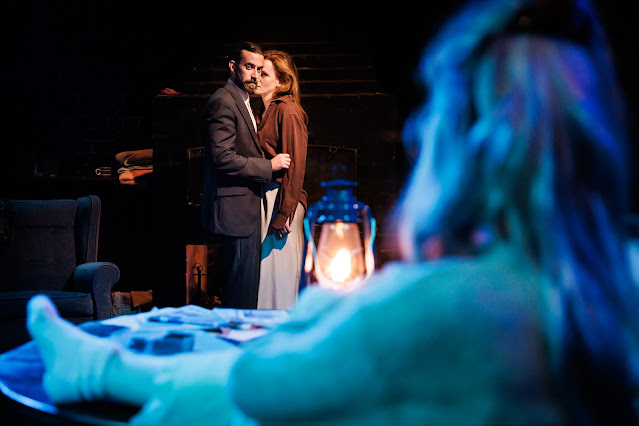Syl
fantasises about leaving the house and the child, giving up this life for that
of a dancer. Albert tells her she can’t because he’d go mad raising a child by
himself. He’s not even all that interested in hearing about her day, trying to
put the baby down for its afternoon sleep.
She takes
the child upstairs.
Later,
after Reg the interloper arrives looking for Jack, their housemate – who says
he willed Reg to come, Syl says she’s nearly thirty and she’s not that good a
dancer. “If I haven’t a child in the next five years, I’m not likely to have
one at all.”
She hasn’t
had a baby? Where has the baby gone? It’s slipped from the narrative. It was
there, we saw it. Just as we saw Syl and Albert interact like we might expect a
long-married couple to do.
Soon, out
of view of Albert, Syl is kissing Jack. Is she having an affair or is something
else going on? Have we misinterpreted the relationships all along? Or have we
been deceived by the storyteller and theatre-makers?
Laurence
Strangio’s production of Caryl Churchill’s 1977 play, Traps, is warm and
inviting – all the better to deceive us; the audience is seated on the
periphery of the home the play takes place in. It’s immersive but not
interactive, we’re told. There are only six actors in this play, but how many
characters? How many versions of these characters do we witness as we observe
these people – physically, emotionally and mentally trapped by society and
personal circumstances.
 Evie
Housham’s naturalistic but eclectic production design coupled with Clare Springett’s
evocative lighting turns La Mama HQ into the living room of a house that is
comfortable and cosy, though with stuff of life scattered around – an ironing
board, a half-finished jigsaw puzzle, a stack of towels and a pile of kicked-off
shoes. The play includes a lot of stuff for the characters to bond over – card games
and tricks, meal preparation, ironing and a steel tub for bathing. All of this
business helps to create a reality that feels true but doesn’t quite add up.
Evie
Housham’s naturalistic but eclectic production design coupled with Clare Springett’s
evocative lighting turns La Mama HQ into the living room of a house that is
comfortable and cosy, though with stuff of life scattered around – an ironing
board, a half-finished jigsaw puzzle, a stack of towels and a pile of kicked-off
shoes. The play includes a lot of stuff for the characters to bond over – card games
and tricks, meal preparation, ironing and a steel tub for bathing. All of this
business helps to create a reality that feels true but doesn’t quite add up.
The ensemble
of actors is strong, making us believe in moments that will be overturned or
undercut later – by even more moments that feel true. It’s quite a feat to be
able to draw an audience in over and over, effectively introducing us to new
versions of these people scene by scene, moment by moment.
Meg Spencer’s
work as Syl is delicate and complicated, every gesture and inflection giving
insight to each glimpse into her character. Dom Westcott’s Del brings a frightening
physicality to the space and even when he’s being gentle, that fury is raging
underneath. Jack is a hard character to pin down and Scott Middleton’s range effectively
keeps us questioning his position and motivations.
Caryl
Churchill’s work is never easy; it requires strict attention and wrestling with
during the play and after. Are these parallel universe versions of these
people, flickering in and out in front of our eyes? Even that kind of
explanation is out of our reach because Churchill doesn’t give us enough
information. What she gives us is a series of truthful interactions, spied upon
by the audience and watched over by a ticking clock that moves in real time
throughout the play – as unnerving as the real fire in the fireplace is
comforting.
Traps slips and slides around in front of
our eyes, a beautiful parade of truthful human moments that resist simple
narratives and without easy resolution or answers.
Laurence
Strangio has done a beautiful job with this text and I really wish you could
see it, but the season is sold-out.
- Keith Gow, Theatre First
Traps at La Mama closes this weekend.
Photos: Darren McGill


Comments